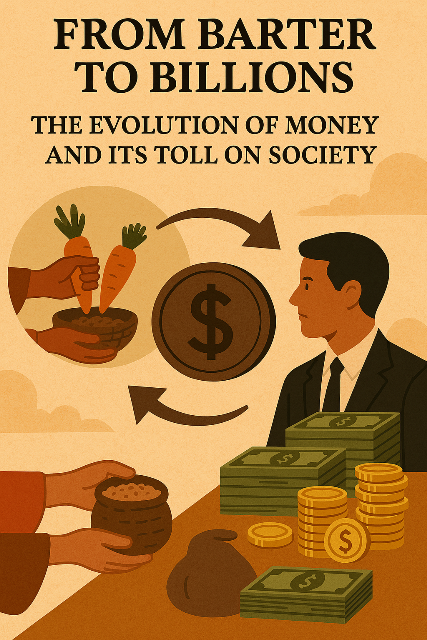From Barter to Billions: The Evolution of Money and Its Toll on Society
Introduction
Why do the impoverished continue to perish while an elite few thrive? A closer look at our money system reveals a stark reality: poverty is not merely a chance occurrence but a systemic flaw—one that has grown over centuries into a self-perpetuating cycle of inequality.
The Stark Imbalance of Wealth
It is astounding to realize that only 10% of the population controls more than 90% of the world’s wealth, leaving the remaining 90% to share a meager 10%. This extreme concentration of wealth not only deprives the vast majority of necessary resources but also creates a fertile ground for conflict. As millions struggle to secure their next meal, the desperation often escalates into crime, conflicts, and even loss of life. Such disparity forces us to ask: What is the true cost of a system that commodifies every aspect of our lives?
Political Promises and Perpetuated Disillusionment
Every five years, we place our hope in elected ministers with promises of change and upliftment. Yet, once in power, these officials often fade from the daily struggles of their constituents—sequestered behind layers of security and protocol. Once dining side by side with ordinary citizens, they transform into distant figures whose concerns seem limited to maintaining their own status. The disappointment that follows is palpable, reinforcing the idea that expecting a government to rectify centuries-old systemic imbalances is a flawed—and ultimately, a dangerous—dependence.
From Barter to the Birth of Money
In the early days of human civilization, communities thrived on direct exchange. The barter system, with its intrinsic limitations, curbed greed by emphasizing balanced exchanges over excessive accumulation. However, the introduction of the money system—originally a simple seed of an idea—has evolved into an institution where wealth can be exponentially multiplied. Over time, this system not only detached us from the principles of fair exchange but also paved the way for unbridled greed and exploitation.
Imagining Alternative Solutions
If we are to address the persistent grief of poverty, alternative approaches to the money system must be considered. One provocative idea is to abolish the unfettered pursuit of wealth altogether or, at the very least, implement a cap on individual earnings. Imagine a framework where any income beyond a certain threshold is redistributed to those in need. Under such a model, the relentless drive for more would be tempered by societal responsibility, allowing greater opportunities for a broader segment of the population to flourish.
Yet, this is not to suggest that governmental intervention alone can fix these deep-seated problems. History teaches us that relying on ministers—or any single entity—to perform miracles is futile. Transformation begins with the individual: while public infrastructure and policy improvements play important roles, lasting change demands personal initiative as well.
The Path Forward: Self-Reliance and Systemic Reform
In reflecting on the current state of affairs, it becomes clear that the solution lies not solely in electing the “right” leaders but in rethinking the very framework of our society. Instead of placing blind trust in political promises, we must empower ourselves by seeking knowledge, honing our skills, and collectively advocating for systematic reform. For instance, while a coconut seller cannot become an IAS officer without personal effort and transformation, a society that recalibrates its economic principles can create room for upward mobility and genuine equality.
Conclusion
The modern money system, with its roots in colonial expansion and unbridled ambitions, has evolved into an engine that magnifies wealth disparities and perpetuates the cycle of poverty. It is a reminder that systems, however grand in their design, must ultimately serve people—and not the other way around. By reimagining economic policies, setting fair wealth ceilings, and encouraging individual self-reliance, we may begin to mend a system that too often seems designed to favor the few at the expense of the many.
In the final analysis, the fate of our society rests on balancing systemic reform with personal responsibility—a dual approach that questions traditional power structures and empowers individuals to shape their own destinies. Only by addressing these challenges head-on can we hope to transform a system that has, for too long, inflicted needless suffering on the world’s impoverished.



